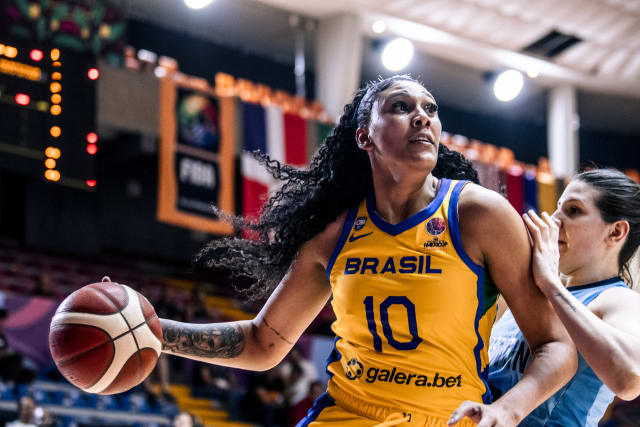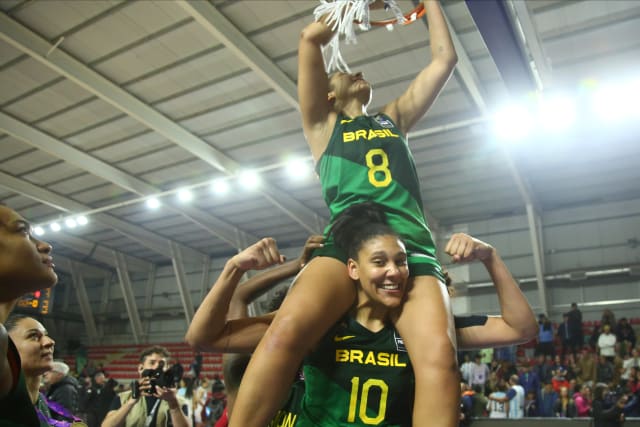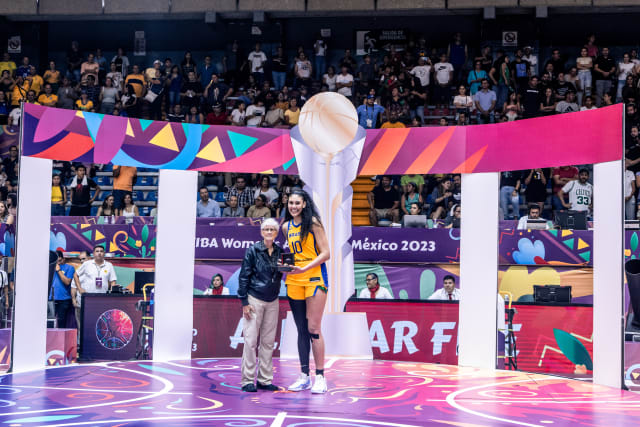Brazil's Kamilla Cardoso carries home with her at every stage
Kamilla Cardoso arrived in America with Amazon Rainforest-sized potential. At just age 15, the Brazilian basketball phenom bravely moved from her hometown of Montes Claros, Brazil to Chattanooga, Tennesse.
MIAMI (United States) - Kamilla Cardoso arrived in America with Amazon Rainforest-sized potential.
At just age 15, the Brazilian basketball phenom bravely moved from her hometown of Montes Claros, Brazil to Chattanooga, Tennessee to pursue her basketball mission: Play college basketball, reach the WNBA.
A self-proclaimed “momma’s girl,” Cardoso’s decision was gut-wrenching. She left behind her mom, Janete Soares, and older sister, Jessica Silva, for the robust basketball scene in America, which began at Hamilton Heights Christian Academy in Chattanooga.

“I miss them 24/7,” Cardoso said. “Sometimes when I’m in class, I think about them and I just cry. Missing them is the hardest part.
“But I was like, ‘I want to do this for real, not just for fun.’ I knew that coming to the United States, I’d get a great education, play basketball and do something I love.”
Cardoso recently concluded her junior season on the South Carolina women’s basketball team, one of the great programs of 21st century NCAA women’s hoops. In the past three years, she’s anchored the paint for the SEC champion Gamecocks, earned ACC Freshman of the Year honors at Syracuse (her previous collegiate stop) and even led Brazil to a gold-medal finish at the FIBA South American Championships.

Cardoso is a star — and she’s hurdled mammoth barriers. In 2015, she arrived in America undersized, homesick and clueless as to how to communicate.
“I didn’t speak English at all,” Cardoso said. “All I could say was, yes, no, bye and hello.”
That gap proved challenging when a group from Hamilton Heights picked 15-year-old Cardoso up at the Hartsfield-Jackson Atlanta International Airport, her first time ever stepping foot on American soil.
“I was scared,” Cardoso said. “I didn’t know how to communicate with them. They were very genuine and supportive, though. They used Google Translate. I felt much more calm after they talked to me through translating.”
Cardoso then immersed herself in learning English. In Chattanooga, she lived in a house with her Hamilton Heights coach, Filipe Goncalves, and eight teammates, all of whom spoke English.
Ver esta publicación en Instagram
“No one else spoke Portuguese, so I had to learn,” Cardoso said. “They used to teach me, and I used to write down every word in translate. That’s how I learned.”
She was able to hold a conversation three months later. After six months, she described herself as “confident” with English.
“That’s when I wasn’t scared of making mistakes,” Cardoso said. “After I was able to communicate, I was so proud of myself. I said, ‘I did it.’”
Next, to compete on American courts, the 6-foot-7 Cardoso needed to grow her frame.
“I knew I couldn’t just rely on my height,” Cardoso said, “I had to lift weights, because I was skinny. And when I tell you I was skinny, I was super skinny.”
So gaining weight was imperative, but there was one major problem.
“The food here was very different for me,” Cardoso said. “I went a couple of weeks without eating much.
“My mom used to cook every morning, every night, every afternoon. I was very used to Brazilian food.”
Eventually, Cardoso said she grew accustomed to American cuisine and its, well, idiosyncrasies.
She regularly lifted weights, dedicated herself to nutrition and gained 30 pounds in a single high school season.
“I got a nutritionist and was eating more protein,” Cardoso said. “Even though I didn’t like the food, I was eating more so I could gain some weight.”
The added bulk enabled Cardoso to bully her way through high school to the tune of 24.1 points, 15.8 rebounds and 9.2 blocks — nearly a triple-double — as a senior. Cardoso graduated from Hamilton Heights as the No. 1 ranked center in the Class of 2020 and garnered McDonald’s All-America recognition.
Ver esta publicación en Instagram
Perhaps most crucially, she earned scholarship to play Division I basketball at Syracuse, where Cardoso was the ACC’s co-Defensive Player of the Year as well as the league’s top freshman.
From Upstate New York, she transferred to Columbia, South Carolina, where Cardoso now plays at South Carolina, learning from a legendary head coach: two-time NCAA champion and three-time Naismith Coach of the Year Dawn Staley.
“She’s your coach and your friend,” Cardoso said. “She isn’t all about basketball. She’ll talk to you and listen to you. She gives the best advice ever. She’s just the best in the business.”
Ver esta publicación en Instagram
A far cry from the undersized and confused 15-year-old, Cardoso has evolved into a college basketball star in America, oozing with WNBA potential.
“I’m much more confident than before,” Cardoso said. “I’ve grown a lot. I’m more comfortable in myself, inside and outside of the court.
“I see myself as a strong person. I had to move out of my home when I was 15. I’m a momma’s girl, so being away from my family for seven years is hard.”
But home and Brazil still loom large in Cardoso’s heart — and on her game schedule. She’s represented the nation four times since 2021, winning gold at the 2022 South American Championships, suiting up on Brazil’s World Cup Qualifying team and lifting the Brazilians to bronze at the 2021 FIBA AmeriCup.
Most recently, she powered Brazil to a gold at the 2023 FIBA Women’s AmeriCup in Leon, Mexico.
Ver esta publicación en Instagram
“I was way more dominant and aggressive,” Cardoso said. “I’ve been working on that for the past couple of months. This tournament was really helpful for me to realize the things I can do on the court. That will help me to be more dominant now.”
Cardoso racked up 10.9 points and 8.3 rebounds per game, shooting nearly 60% from the floor. She was selected as Tournament MVP. In the title game, she and Brazil took down Team USA, which featured her South Carolina teammate and roommate Raven Johnson.

“South Carolina prepares me for everything in life, whether it’s international basketball or the pros,” Cardoso said.
Her career highlight so far has been donning Brazil’s flag, the Bandeira do Brasil, across her chest in games.
“It meant a lot,” Cardoso said. “There are plenty of girls and boys back at home who have a dream to play basketball, but they don’t think they’re capable of doing it. When I’m doing this for my country, I’m representing every one of these little boys and girls.
“I think everything is possible in life. If I can make it, everyone else in Brazil can make it. They just have to keep working hard.”
Cardoso will always cherish her hometown of Montes Claros. She FaceTimes home twice a day, visits every summer and plans to grow basketball there in the long-term.
“I want to bring basketball to my hometown,” Cardoso said. “In Brazil, we have a lot of poor people, and sports can save lives. Sports can get young people off the streets. I want to bring basketball to help those people.”
FIBA